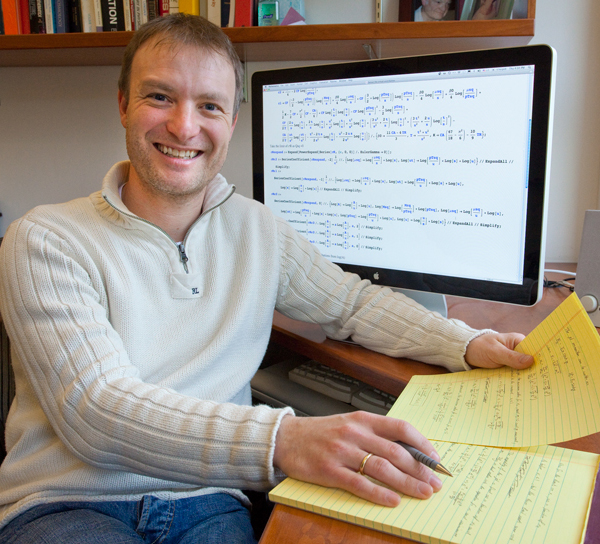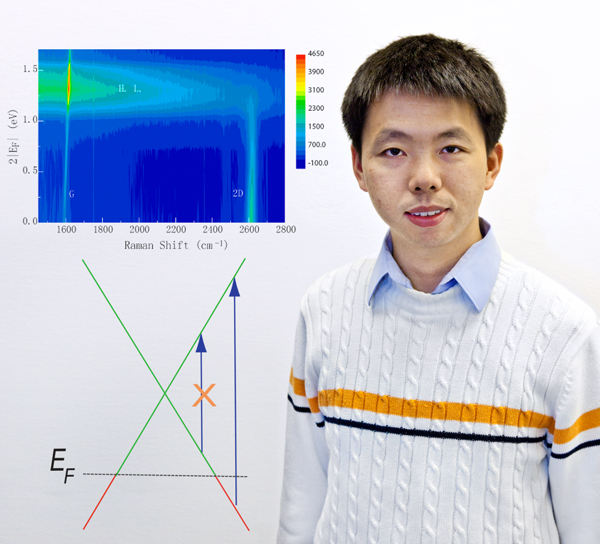
Christian Bauer, theoretical physicist (Photo by Roy Kaltschmidt, Lawrence Berkeley National Laboratory)
The White House today announced that President Obama has named two researchers at the U.S. Department of Energy’s Lawrence Berkeley National Laboratory (Berkeley Lab) as winners of this year’s Presidential Early Career Award for Scientists and Engineers (PECASE). The winners are Christian Bauer of the Lab’s Physics Division and Feng Wang of the Materials Sciences Division. Their awards include a citation, a plaque, and continued DOE funding of their research for up to five years. PECASE awards are the U.S. government’s highest honors to outstanding scientists and engineers, early in their independent research careers.
Christian Bauer is cited for “developing crucial computational tools that will enable physicists at the Large Hadron Collider to distinguish new discoveries from known processes; for delivering an event-generator simulation package that captures the most accurate state-of-the-art calculations; and for mentoring future high-energy physicists.”

Feng Wang, condensed matter physicist (Photo by Roy Kaltschmidt, Lawrence Berkeley National Laboratory)
Feng Wang is cited for “pioneering research on ultrafast optical characterization of carbon nanostructures that has advanced the fundamental understanding of the electronic structure of graphene and is expected to enable the development of advanced-energy-relevant technologies.”
Besides Bauer and Wang, 11 other PECASE award winners were among those nominated by DOE, all chosen from scientists whose work is funded by DOE’s Office of Science or the National Nuclear Security Administration.
“These young scientists are using their talents to help our nation build a brighter future,” says Energy Secretary Steven Chu. “I congratulate them on their accomplishments, and I look forward to their future achievements.”
Berkeley Lab Director Paul Alivisatos says, “The Presidential Early Career Awards are essential to support and encourage the creative efforts of young scientists and engineers, whom we depend on to keep reminding us that there’s no end to scientific understanding. The PECASE awards show our nation’s commitment to supporting the enthusiasm of young researchers in their search for new discoveries that can change our view of the world – and change the world itself for the better.”
Says theoretical physicist Christian Bauer, “I’m very honored to receive this prestigious award, and very grateful to DOE’s continuing support for my theoretical work on the exciting science at the LHC. A lot of my efforts are dedicated to developing theoretical foundations for accurately simulating the flood of information coming from the LHC, which is crucial in our quest to find new physics in that data.”
“For a young scientist the first years are the most critical,” says Feng Wang, who focuses on the fundamental science and potential applications of graphene’s optoelectronic properties. “The Presidential Early Career Award provides not only financial support but encouragement, letting us know that we’re doing well. I am extremely happy and honored by this award. It will have a huge impact on my work.”
Berkeley Lab scientists have won 14 Presidential Early Career Awards for Scientists and Engineers since the program was founded in 1996. This year’s PECASE awards include a total of 94 researchers, supported by 14 federal departments and agencies. The winners will receive their awards on Friday, October 14, 2011 at a White House ceremony.
###
For more about the PECASE awards and this year’s winners, see the White House press release at http://www.whitehouse.gov/the-press-office/2011/09/26/president-obama-honors-outstanding-early-career-scientists.
For more about the DOE winners, see http://energy.gov/articles/thirteen-department-energy-researchers-honored-presidential-early-career-award-scientists.
Lawrence Berkeley National Laboratory addresses the world’s most urgent scientific challenges by advancing sustainable energy, protecting human health, creating new materials, and revealing the origin and fate of the universe. Founded in 1931, Berkeley Lab’s scientific expertise has been recognized with 12 Nobel prizes. The University of California manages Berkeley Lab for the U.S. Department of Energy’s Office of Science. For more, visit www.lbl.gov.